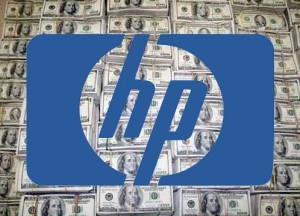HP has announced a US$8.9 billion loss for its third quarter due to writedowns and weak hardware sales.
The company also said full-year results would be at the low end of its previous guidance.
Earlier this month, HP said it would take an $8 billion “impairment of goodwill” writedown against its services division. “Goodwill” refers to fewer tangible assets, such as brand strength, that are considered when figuring out a company’s total value. HP’s $13.9 billion acquisition of services provider EDS has been roundly criticised as too costly.
HP also said earlier this month that it would have a bigger-than-expected charge in the third quarter in connection with a workforce reduction plan announced earlier this year.
Revenue for the third quarter fell 5 percent year over year to $29.7 billion.
Without the writedowns and other one-time costs, third-quarter profits would have been $1.97 billion, down 9 percent year over year.
Excluding one-time costs, full-year earnings per share will be $4.05 to $4.07. In May, HP said it expected full-year earnings of $4.05 to $4.10 per share.
Personal Systems Group revenue in the quarter fell 10 percent to $8.6 billion, with a 12 percent drop in consumer spending and a 9 percent fall in commercial purchases. Within the segment, desktop units fell 6 percent and notebook units dropped 12 percent.
Imaging and Printing Group sales were down 3 percent to $6 billion. While commercial sales rose 4 percent, consumer purchases dropped 13 percent, according to HP.
Services revenue fell 3 percent to $8.75 billion.
Enterprise servers, networking and storage sales dropped 4 percent to $5.1 billion, with the biggest hit taken by Business Critical Systems, where revenue fell 16 percent.
The BCS segment includes high-end servers made with Intel Itanium chips. HP recently won a legal decision in connection with a lawsuit it filed against Oracle, following Oracle’s announcement that it would stop porting its software to Itanium. HP has attributed slumping BCS sales to uncertainty caused by the dispute.
Software sales rose 18 percent to $973 million, driven by last year’s acquisition of Autonomy. However, new license growth, a key indicator of health in a software business and the mood of customers for starting new projects, rose only 2 percent. Software-related support revenue was up 16 percent and software services rose 65 percent.
HP rival Dell also released financial results this week, reporting Tuesday that second-quarter profit had fallen 18 percent due to lower sales of desktop PCs, laptops and other mobile products.
HP CEO Meg Whitman, who took over last year following the ouster of Leo Apotheker, has been tasked with reversing HP’s fortunes as it attempts to reinvent itself as more of a software company and remain a viable player in hardware.
“Make no mistake about it, we’re still in the early stages of the turnaround,” Whitman said during a conference call on Wednesday. “The near-term outlook will be challenging as we set this company up for the long term.”
While the enterprise services division’s performance “was within our expectations, there’s a lot of work that needs to be done,” Whitman added.
Earlier this month, HP announced new leadership for the division. “We will turn [enterprise services] around,” she said.
PC sales were hurt by aggressive price competition as well as general “enterprise weakness,” Whitman said.
Autonomy “still requires a great deal of attention,” Whitman said. HP has put a number of measures in place, including a global dashboard to track pending sales, a single sales methodology, and steps aimed at improving “post-sale” customer satisfaction, she added.
HP shed 4,000 workers in the quarter as part of a 27,000-employee reduction plan, according to Whitman. This was helped by “greater-than-expected acceptance” of an early retirement program, she said.
HP has strong hopes for new product lines coming later this year, which include a wave of PCs and tablets, multi-function printers and security software, Whitman said.
While speculation has long swirled over whether HP will divest itself of major lines of business, such as its PC division, Whitman downplayed such a scenario.
Some smaller assets and programs might be shut down, and others sold, she said. “But these are not big-dollar items.”






